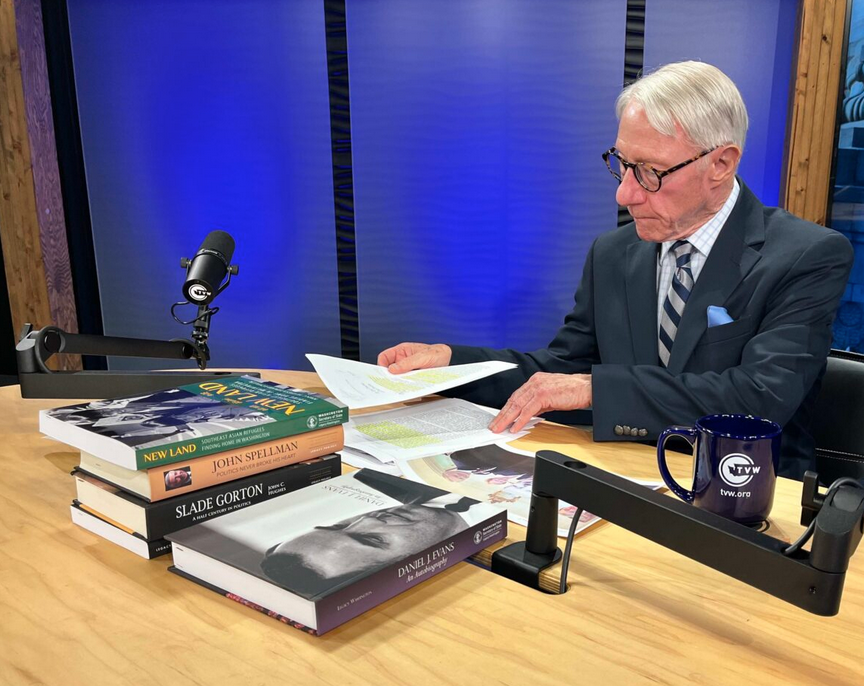State historian closes book on career … in a melancholy mood
Published 1:54 pm Tuesday, July 15, 2025
John C. Hughes is, at root, a storyteller. As he marks the end of a nearly six-decade career that spanned hot-type newspapering on the coast to crafting the biographical record of Washington’s political and civic leaders, he recognizes a shift in his own disposition. Once sanguine about civic life, even with all its faults, he finds himself in a funk at this time of transition — morose, melancholy and discouraged.
As he prepares to retire, Hughes leaves behind a shelf full of books, countless oral histories, and a warning: The decline of journalism and civic memory threatens democracy itself.
His body of work began in his hometown, where he still lives. “Grays Harbor is one of those places that has terroir, a sense of place,” Hughes said, explaining his lifelong connection to the timber town of Aberdeen, where he spent 42 years at The Daily World, eventually rising to editor and publisher. He turned down jobs at larger newspapers, including offers from The Seattle Times, out of a commitment to community journalism. “There was something in my blood,” he said. “It’s where I think I belong.”
Trending
Poignant conversation
In a wide-ranging and often poignant conversation with Austin Jenkins on TVW’s Inside Olympia, Hughes said his career began as a reporter in the mid-1960s. Washington had dozens of small daily newspapers with vibrant newsrooms. The Daily World boasted a staff of 21 reporters at its peak. Today, Hughes noted, the paper employs just three journalists and its circulation has plummeted below 5,000. “We had three great photographers on staff, we did investigative work, we went toe to toe with the big-city papers,” he recalled.
The loss, he said, is not just in jobs or prestige. It’s civic. “There’s a direct line between the decline of newspapers and the decline of civic engagement,” Hughes said. “When people don’t know their own stories, they don’t know how to defend their communities.”
As chief historian for Legacy Washington, a project of the secretary of state’s office, Hughes transitioned from reporting the present to preserving the past. In that role, he conducted hundreds of interviews and authored or co-authored 17 books over 17 years, telling the stories of governors, judges, lawmakers, civil rights pioneers, and cultural figures, all of whom left an indelible mark on the state. His subjects include Gov. John Spellman, Sen. Slade Gorton, columnist Adele Ferguson, and former first lady Nancy Evans.
When asked which of his books he considers most consequential, Hughes pointed to “John Spellman: Politics Never Broke His Heart,” praising Spellman as a one-term Republican governor who vetoed a massive pipeline project out of environmental concern. “The Inimitable Adele Ferguson” stands out for its portrait of the legendary Bremerton political columnist who held Olympia’s feet to the fire. And “Slade Gorton: A Half Century in Politics” documents the arc of a brilliant, if polarizing, legal and political career.
‘New Land’
Trending
His most recent book, “New Land,” co-authored with historian Ed Echtle, tells the story of Washington’s resettlement of Southeast Asian refugees after the Vietnam War, including many in Pacific County. Hughes credits former Gov. Dan Evans, former Secretary of State Bruce Chapman and then special emissary to the governor Ralph Munro as exemplars of what he calls “latter-day profiles in courage.”
“These are stories that animate us toward citizenship,” he said. “They’re about people who did the right thing when it wasn’t easy.”
Despite working for a statewide elected official, Hughes has maintained a fierce sense of professional independence. “I am in no way a spokesman for the Office of the Secretary of State,” he said. “There hasn’t been a partisan litmus test, not once.”
His ability to write 17 books in 17 years? That, he said, comes from the rigors of daily journalism. “When you become an accomplished journeyman deadline reporter, then you can write quickly,” he said. “I just love storytelling.”
That storytelling instinct was reinforced early by Murray Morgan, the renowned historian and author of “Skid Road,” who once advised Hughes to “be a newspaperman first” to sharpen his writing and his instincts.
But along with the pride in his work comes melancholy. Hughes has written about many people who are now gone — including Gorton, Spellman and Ferguson. “My mom always said the best thing about people who were so alive when they were alive is that when they’re gone, it’s like they’re really still here,” he said. “But you still miss them.”
That sense of loss extends to institutions. Hughes mourned the state’s decision to shutter the Washington State Library and the Talking Book & Braille Library due to budget cuts. “I can’t think of anything more gratuitously stupid than to close a great cultural institution like the Washington State Library,” he said.
Political realignment
Looking back on his hometown, Hughes has also witnessed political realignment. Grays Harbor, once a Democratic stronghold, has voted for Donald Trump in three consecutive elections. Hughes was not surprised. “The grievance on Grays Harbor is that the Democratic Party has, in essence, said, ‘Let them eat cake.’”
He spoke of the disappearance of “lunch-bucket Democrats” — moderate, labor-aligned lawmakers like Sid Snyder, Jim Hargrove and Brian Blake. “A breed of Democrat that’s pretty much extinct at this point. Maybe [they’ve] gone the way of the spotted owl.”
Ultimately, Hughes worries about the future of democracy. “I believe these are perilous times for American democracy,” he said. “If we don’t understand our history — if we don’t teach civics and truth—then we lose the shared values that hold us together.”
After a career that spanned both headlines and history books, Hughes summed it up simply: “I count every day as a real blessing. And I get to tell these stories.” Affirming Morgan’s famous formulation, Hughes says, “Journalism is the sport of kings.”
This article was first published by TVW, Washington’s Public Affairs Network, providing unedited coverage of the state legislature and state government, on statewide cable TV and online at tvw.org.










